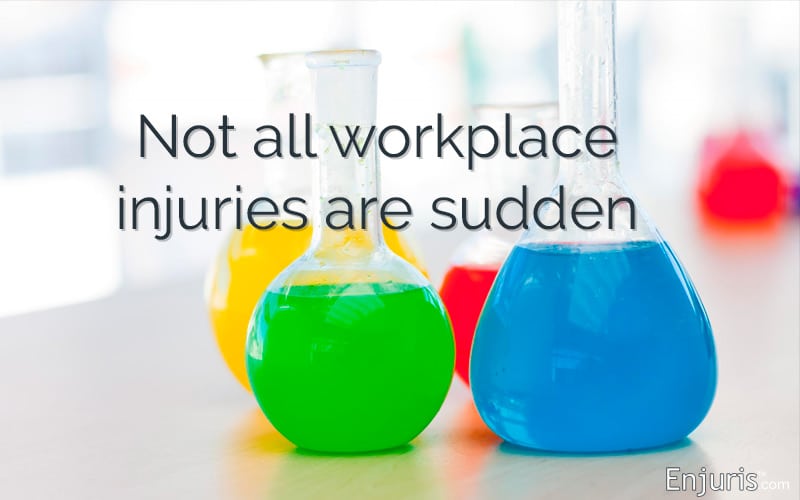
Is your work-related disease covered under workers’ compensation?
When an injury happens on the job that’s a direct result of an incident or accident, you know just what to do. Usually, it’s covered by workers’ compensation and you receive treatment and recover costs quickly.
An occupational disease is a condition that develops as a result of prolonged exposure in the workplace. But in order to receive workers’ compensation benefits to cover the costs of medical treatment and missed work days, you need to prove that your condition is the direct result of your job.
This standard of proof can be more difficult for individuals suffering from an occupational illness or disease.
Types of occupational diseases and illnesses
Environmental exposure. Some occupational diseases are caused by exposure to chemicals or irritants. This could include:
- Lead poisoning
- Radiation illness
- Industrial asthma
- Mesothelioma/lung diseases
- Chemical poisoning
- Industrial dermatitis
- Neurological disorders
- Bloodborne diseases
Physical stress. An occupational injury isn’t always because of a specific incident or accident. It can also be the result of repetitive motion or ongoing physical stress on your body. For example:
- Carpal tunnel syndrome
- Tennis elbow (tendinitis)
- Temporary or permanent injury to muscles, nerves, ligaments, and tendons
There are certain occupations where there’s a higher likelihood of occupational disease: mining, construction, welding, agriculture, aerospace, and the food sector. You could also be at higher risk if you are routinely exposed to noise, fumes, fibers, dust, or other hazardous environmental elements.
An example of a single-occurrence workplace injury is a slip-and-fall on a construction site that results in a back injury. By contrast, someone who works in a restaurant kitchen might be diagnosed with carpal tunnel syndrome that’s not the result of just one incident, but is because of ongoing stress to the wrists and hands because of the repetitive motion of slicing food every day.
An occupational disease is also when you’ve been exposed to something like asbestos fibers or other hazardous materials that affect your body over time.
What occupational diseases or illnesses are covered by workers’ compensation?
Fortunately, an occupational disease in Georgia is treated the same way as any other work-related injury. The injured person is entitled to the same workers’ compensation benefits whether it’s a one-time injury or an ongoing disease or condition.
The Georgia State Board of Workers’ Compensation requires injured workers prove the following in order to receive workers’ compensation for an occupational disease or injury:
- That there were specific hazards related to your employment that caused the condition
- That the disease or injury is the natural consequence of exposure to elements in your place of employment
- That the disease was caused by exposure to occupational hazards, and not by something outside the workplace
- That the disease is specific to elements within your workplace, and is not common absent those factors
- That the origin of the disease is related to a risk factor that is connected to your employment
- That the condition developed during your employment
- That the occupational disease or injury is included in the Occupational Injury and Illness Classification System (OIICS)
The OIICS, which was developed by the Centers for Disease Control and Prevention (CDC), codes injuries based on four factors:
- The nature of the injury
- Part of the body
- Source and secondary source
- Event or exposure
In other words, it provides an official list of occupational diseases that have been proven to be a direct consequence of work-related activity or exposure. Even if an injury or illness isn’t included within the CDC coding system, you may still be eligible for workers’ compensation under some medical circumstances.
In general, hearing loss, psychiatric or psychological illness, and heart and vascular conditions are not considered to be occupational diseases.
What to do if you have an occupational disease or illness in Georgia
If you haven’t already been diagnosed, you should visit a physician who is listed in the State Board of Workers’ Compensation Physician Database. A listed provider will be able to make a complete diagnosis and help get you started with a treatment plan.
Next, seek the advice of a Georgia personal injury attorney. An experienced lawyer can help you navigate the complex workers’ compensation system. It might be more challenging to link an occupational disease or injury that’s the result of ongoing exposure or physical stress to your employment, and your lawyer will provide you with resources and guidance to ensure that your costs will be covered.
See our guide Choosing a personal injury attorney.
